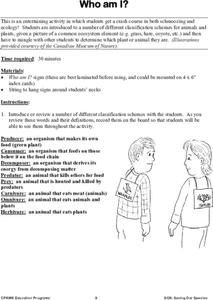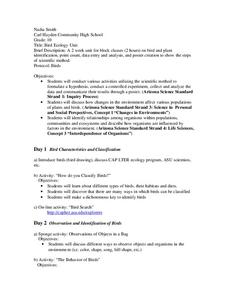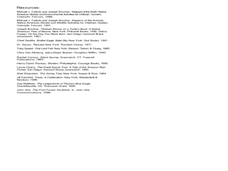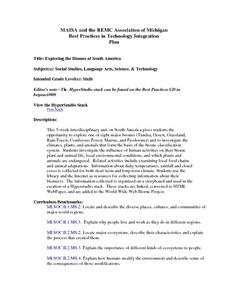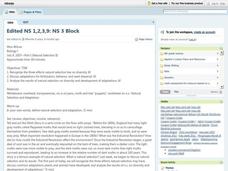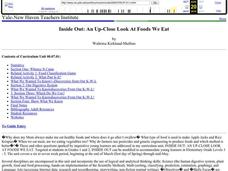Curated OER
Invasive Species
Students explore invasive species. In this species analysis activity, students observe invasive species and review the impact the species have on the environment. Students work in groups to investigate the species in varying habitats....
Curated OER
Relationships and Biodiversity Lab Practice
In this biodiversity activity, high schoolers determine the relationship and complete the evolutionary tree for the plants listed. Students review genetic code and DNA sequencing. This activity has 1 graphic organizer, 8 multiple choice,...
Montana Natural History Center
Studying Grassland Ecosystems
At first glance, grassland ecosystems might seem dull and uninteresting, but once you start to explore it's amazing the things you'll find! Through this series of engaging lessons, activities, and experiments, elementary students examine...
Curated OER
Who Am I?
Learners classify organisms into one of five categories: producer, consumer, decomposer, predator, or prey. Students play a "Who Am I" game. Signs are hung on the backs of fellow learners They must ask questions to determine what...
Curated OER
The Living Environment
In this living environment worksheet, students complete a crossword puzzle given 34 clues about the various species in the environment that produce, consume and decompose. Topics also include photosynthesis, respiration, glucose, organic...
Curated OER
Bird Ecology Unit
Tenth graders conduct various activities utilizing the scientific method to formulate a hypothesis, conduct a controlled experiment, collect and analyze the data and communicate their results through a poster. They also identify...
Curated OER
Insects and Spiders
Students make either and insect or a spider using materials their teacher provides. They then draw of picture of their organism and defend why it is either a spider or an insect.
Curated OER
Making Pretzels
Students explore how people use plants for food. They use pretzels to see how wheat can be turned into food.
Curated OER
Seed Dispersal
Students determine seed dispersal methods. In this life science lesson, students make predictions about how seeds might move, then look at seeds under micrographs or microscopes to analyze the seed coat and how this helps dispersal. ...
Curated OER
Red Tail Ridge Wetland Study Project
Fifth graders use a real life scenario of the wetlands to gather information on creatures of the habitat. In this wetlands lesson, 5th graders research the interdependence of organisms in a healthy habitat. Students collected samples...
Curated OER
The Changing Me
Third graders study the human body. In this health lesson plan, 3rd graders discuss that everyone's body is growing, measure body parts using a tape measure, and color the body worksheet.
Curated OER
Exploring the Biomes of South America
Sixth graders complete a five-week unit investigating the eight major biomes of South America. They conduct Internet research, collect short-term and long-term climate data, and create a HyperStudio slideshow stack about a selected biome...
Curated OER
Exploring Limu Diversity
Students explore limu diversity. In this ocean ecosystem lesson, students classify limu according to its physical properties. Students work in small groups to generate scientific observations and sort limu by characteristics.
Curated OER
Natural Selection And Evolution
Students investigate the concept of evolution and how natural selection is used as an indicator that evolution has happened. They recognize the three effects it has on diversity and how adaptations can develop. Diversity is explained as...
Curated OER
Invertebrates
Students identify the characteristics common to all animals. In groups, they compare the characteristics between the animals and how they are divided. To end the lesson, they compare the eight phyla of invertebrates and review the...
Curated OER
Classifying Living and Non-Living Objects
Students investigate living organisms and define the properties of a living species. In this life characteristic activity, students examine plants in their class and discuss whether or not they are alive. Students create a living vs....
Curated OER
Dichotomous Chips
Young scholars create a dichotomous key to different varieties of potato chips. In small groups, they observe and record characteristics of the potato chips to use in the key. They switch keys with another group to see if they can...
Curated OER
Exploring Hawaii's Beaches
Fourth graders search the shore and find objects on the beaches of Hawaii. In this exploring Hawaii's beaches lesson, 4th graders play "I Spy" with objected collected at the beach. Students compare biotic and abiotic materials and...
Curated OER
What's in Our Woods?
Students observe their local forest and document the change that occurs over the school year. For this forestry lesson, students utilize a GPS to mark a certain area of the woods as their study area for the remainder of the year....
Curated OER
Inside Out: An Up-Close Look At Foods We Eat
Fourth graders identify the origins of meats and vegetables consumed by humans on a daily basis. They classify foods (meats, dairy products, grains...) and create a food pyramid.
Curated OER
Biodiversity in Illinois-Pond Habitats
Second graders construct a pond habitat in the classroom using a small swimming pool partially filled with water, real cattails, a tree log adjoining, and plastic animal life appropriate to a pond setting. They examine the frog in detail...
Curated OER
Daisyworld: Stella Mac or PC
Students investigate Daisyworld, a very simple planet that has only two species of life on its surface - white and black daisies, and bare ground. They construct a Stella model of Daisyworld and perform guided experiments to explore the...
Curated OER
Ecology 8 Land Biomes
Pupils identify and describe the main features of one land biome. After researching what a biome is, they give various examples of biomes around the world and in their backyards.
Curated OER
Biotic Factors
Students identify individual organism, a species, and a population within the study community. They identify biotic factors at the site and attempt to characterize the site's species diversity.





